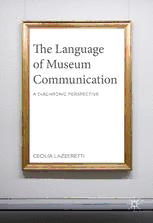
The Language of Museum Communication: A Diachronic Perspective PDF
Preview The Language of Museum Communication: A Diachronic Perspective
The Language of Museum Communication A DIACHRONIC PERSPECTIVE CECILIA LAZZERETTI The Language of Museum Communication Cecilia Lazzeretti The Language of Museum Communication A Diachronic Perspective Cecilia Lazzeretti Università degli Studi di Modena e Reggio Emilia Modena , Italy ISBN 978-1-137-57148-9 ISBN 978-1-137-57149-6 (eBook) DOI 10.1057/978-1-137-57149-6 Library of Congress Control Number: 2016948106 © Th e Editor(s) (if applicable) and Th e Author(s) 2016 Th e author(s) has/have asserted their right(s) to be identifi ed as the author(s) of this work in accordance with the Copyright, Designs and Patents Act 1988. Th is work is subject to copyright. All rights are solely and exclusively licensed by the Publisher, whether the whole or part of the material is concerned, specifi cally the rights of translation, reprinting, reuse of illustrations, recitation, broadcasting, reproduction on microfi lms or in any other physical way, and trans- mission or information storage and retrieval, electronic adaptation, computer software, or by similar or dissimilar methodology now known or hereafter developed. Th e use of general descriptive names, registered names, trademarks, service marks, etc. in this publication does not imply, even in the absence of a specifi c statement, that such names are exempt from the relevant protective laws and regulations and therefore free for general use. Th e publisher, the authors and the editors are safe to assume that the advice and information in this book are believed to be true and accurate at the date of publication. Neither the publisher nor the authors or the editors give a warranty, express or implied, with respect to the material contained herein or for any errors or omissions that may have been made. Cover image © Life on white / Alamy Stock Photo Printed on acid-free paper Th is Palgrave Macmillan imprint is published by Springer Nature Th e registered company is Macmillan Publishers Ltd. London To Andrea and Nora Acknowledgements My gratitude is due fi rst of all to Geert Jacobs for providing inspiration and for his valued advice on this book. I am also thankful to Marina Bondi for guidance during the doctoral stage of the research, and to my colleagues at the University of Modena and Reggio Emilia. A word of thanks goes to the museum professionals who contributed to this project, sending materials to be collected in the corpus and provid- ing supportive feedback: Nicholas Donaldson, former Assistant Archivist at the National Gallery, London, now Assistant Archivist at Waddesdon Manor; Mark Pomeroy, Librarian at the Royal Academy of Arts, London; James Sutton, Archivist at the London Victoria and Albert Museum, London; Mary Richardson and Janice Dillard, Librarians at the Chicago Museum of Contemporary Art; Francine Snyder, Director of Library and Archives at the Solomon R. Guggenheim Museum; Heidi Rosenau, Manager of Media Relations and Marketing at the Frick Collection, New York; and Flavia Fossa Margutti, Head of Projects and Publishing Activities at the Venice Biennale. Finally, on a more personal level, I am grateful to my husband and my family, who with their unconditional encouragement and support over the years have made this work possible. vii Contents 1 Introduction 1 1.1 Museum Press Releases 3 1.2 Museum Public Relations 8 1.3 Research Directions 16 1.4 Outline of Contents 17 References 18 2 Th eoretical Background 23 2.1 Th e Discourse of Museum Communication 23 2.1.1 Art Discourse 24 2.1.2 Promotional Discourse 29 2.1.3 Media Discourse 32 2.1.4 Museum Communication: Art-Media Speak 38 2.2 Th e Notion of Genre 40 2.3 Working with Corpora 42 2.4 A Diachronic Approach 49 References 52 ix
